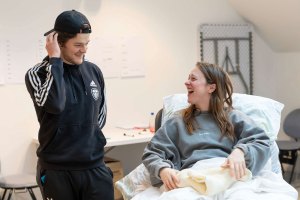Guest Blog: Simultaneous Shakespeare, Learning Lines
Student Nicola Pollard is directing an ambitious project that will see her stage two productions of The Two Gentlemen of Verona at the same time in two different locations – Exeter and Cambridge – on 26 November.
Yesterday was line-learning deadline. So technically, from yesterday onwards, all my actors should be off-book for rehearsals. And they were. When actors can work without scripts in rehearsals, the play is given extra life, extra oomph.
There was comedy I’d never seen before, and my cast seemed more at ease in their movement. Last night’s runs of acts one and two have given me confidence for the next few days – the play is looking good. There are some lovely moments when I can see an actor has really done their homework, and a speech or an exchange has improved three-fold from the last time we rehearsed it. I know it’s in the performer’s best interest to know their lines and blocking, but having actors work hard for me is something I find quite humbling.
This isn’t an assessed piece, it has no relevance to any of our degrees, but the casts and creative teams are devoting so much time and energy to it. All we need now is an audience (see www.simultaneous-shakespeare.info for, erm, info. The site is still under construction so it might not look its best yet.)
Many professional companies demand casts to be off-book before rehearsals start, but students don’t usually (in my experience) operate like that. I find it much easier to learn lines during a rehearsal period, so I can put lines and blocking together at the same time. Learning during rehearsal also means that actors can’t become accustomed to any bad habits or specific delivery before rehearsals start. I have great admiration for anyone who learns lines quickly and easily – I am not one of those people. (Much to the amusement of my parents, I can remember entire verses of songs I sang in primary school shows, but could I remember my times-tables? No. Even when we had the VHS that put them all to music.)
Thinking back to the RSC’s History Cycle that I mentioned at the start of this blog, Michael Boyd commented (in The Guardian, 19 March 2008, online) that all his actors probably had enlarged hippocampuses by the end of the run, resultant of the masses of lines the actors had to learn to perform the eight plays. Eight plays, plus their understudy roles, made a total of about fourteen plays each. Plus blocking, fights, acrobatics… I’m asking my actors to move the flats every now and again to create slightly different stage pictures, plus remember their lines, movement and entrances and exits. I think flying would have been a bit too much. (And our Technical Manager wouldn’t have been so keen.)
My cast have been terrific so far in their attitudes and commitment. This is still evident in the rehearsal room atmosphere, even during the dullest rehearsal of all: topping and tailing scenes for entrances and exits. We didn’t all know each other when we started this rehearsal process, but during yesterday’s run there was warm and supportive laughter.
At the end of the rehearsal we practiced the curtain call, to the music that has been composed especially for the productions. I saw my cast in a line, taking a bow together, and as the music reached a crescendo I felt the shiver that says something collaborative and special has been achieved. Maybe it will all be alright after all. (But we still need an audience!)












